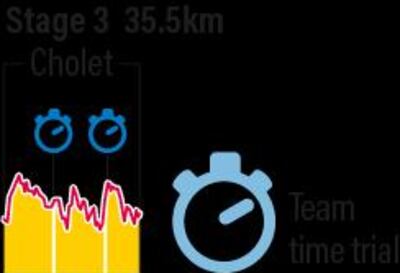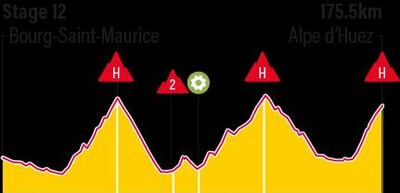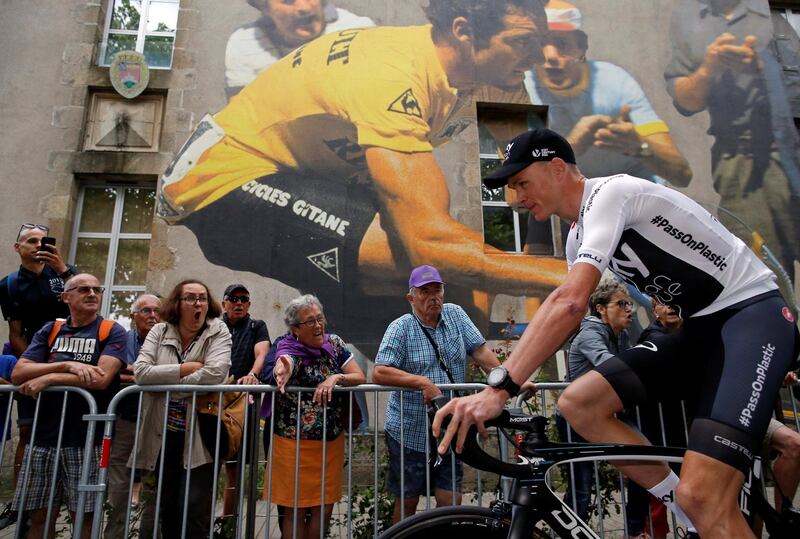A relieved Chris Froome embarks on the long-awaited Tour de France on Saturday but an army of detractors, an array of talented rivals and a course that doesn't suit him stand in the way of a record-equalling fifth title.
Organisers lifted a ban on Froome taking part in the race on Monday after he was finally cleared by cycling's world governing body of doping suspicions linked to his use of asthma medication.
Froome said he was relieved to be back on course for a record-equalling fifth title but organisers felt the need to warn against violence along the three-week course and issue a plea to spectators to respect Froome and his Sky Team, which remains unpopular in France.
_________________
Read more
UAE Team Emirates announce Tour de France line-up
Richie Porte well set for Tour de France challenge
_________________
Froome however was roundly booed on his first meeting with the French public on Thursday when Sky took the stage for the official teams presentation here, and during a kilometre jaunt around the small town of La Roche-sur-Yon.
Officials have drafted in around 30,000 agents to cope with security concerns and deal with the ever-present risk of terrorism as well as protecting the riders.
"I'm just relieved to be racing, and want to draw a line in the sand now," Froome said as his team boss Dave Brailsford added that Sky were used to negativity in France where Froome had been jeered and doused with urine in the past.
Froome said earlier that a huge weight had been lifted off his mind after the Union Cycliste Internationale (UCI) dropped the case against him triggered last September by an adverse analytical finding (AAF) for salbutamol during the Tour of Spain.
The three-week Tour is, as Irish fancy Dan Martin described, "a tale of two halves" this year with a flattish first part featuring treacherous cobbles and crosswinds followed by six mountain and four hilly stages packed into the latter part of the 3,351 kilometres (2,082 miles).
Cobbled roads
Whatever added tests facing Froome, route designer Thierry Gouvenou said the switch between the flat and the mountains "is perhaps the greatest challenge of this Tour".
Huge crowds are expected as the race sets off from France's Atlantic coast and early challenges include an agenda setting 35km team time trial on day three, while a run to the pretty seaside town of Quimper on day five features 10 hills.
There are two ascents of the feared Mur de Bretagne on stage six, and the day before the switch comes the feared cobbled road to Roubaix.
There are more than 20km of roughly hewn cobbles along old mining roads, and cycling folklore has it that the cobbles themselves choose their victims.
Britain's Mark Cavendish, who has 30 stage wins, said it was the hardest Tour de France route he'd ever seen and doubted he'd make it to the mountains.
The race lacks the kind of long, flat individual time trial where four-time winner Froome often pulverises his opponents, programming instead a medium size time-trial in the mountains where a string of climbers who would usually lose time to Froome may actually beat him.
Organisers have also reduced team size, seen as a way of unlocking Sky's stranglehold on the Tour.
The awesome mountains
After a rest day on which the riders fly from the north coast to Annecy in France's southeast, there follows three visually stunning Alpine mountain stages, four hilly stages and three Pyrenean mountain stages inside a breathless 12 days.
Many of France's great mountains will feature, such as the Alpe d'Huez and the Col du Tourmalet.
But the two key mountain challenges are a brutal, uphill 31km individual time trial and a short, sharp shock of a 17th stage with just 65km, featuring 25km of hair-raising descents and 38km of climbs to a summit finish at the Col de Portet in the southwest.
At 2,215 metres (7,265 feet), Portet will quite likely provide the backdrop for a true champion.
Some feel the great French hope Romain Bardet will finally deliver for the home nation with a AG2R-La Mondiale team crafted to hit peak form in the final week.
The experienced Australian BMC leader Richie Porte says he is targetting a podium. His team say he is in tip-top condition and pundits feels he may have something up his sleeve this year.
Movistar's trident of Mikel Landa, Nairo Quintana and Alejandro Valverde will be fascinating to watch while the peloton knows you can never take your eye off Italy's wily Vincenzo Nibali.
Froome can settle many scores and arguments if he can parade past an expected 12 million roadside spectators to join the pantheon of five-time winner on the Champs Elysees in three weeks time.
How to watch
The tour is on Bein Sports from July 7 to July 29
Key Stages
Stage 3 Cholet - Cholet, 35km team time-trial:

Chris Froome's Team Sky wilted at last September's Bergen world team time-trial as the 2017 Giro d'Italia winner Dutchman Tom Dumoulin led Sunweb to victory over the 45km route. This one is shorter, and Sky will have thought long and hard about the make up of the team in a tactical balance between the power for here and the lightweight climbers they'll need for the slog though the mountains.
Stage 9 Arras - Roubaix, 154 km:

Pure climbers will be fretting about their eventual place on the podium when they look at this one with 21km of cobbles, the longest section of them since the 1980s from the fabled Paris-Roubaix classic which require power and endurance with middleweight riders doing well. It starts and ends early to avoid clashing with the World Cup final.
Stage 12 Bourg Saint-Maurice - Alpe d'Huez, 175 km:

Not one, not two but three feared climbs as this Alpine stagetackles the Col de La Madeleine, the Col de la Croix de Fer and the Alpe d'Huez's 21 mythical turns to an eagerly awaited summit finish. With almost 71km in total of climbing, defending champion Froome believes the Tour can be won or lost here and likes the look of it.
Stage 17 Bagneres-de-Luchon - Saint-Lary-Soulan, col de Portet, 65 km:

A short, sharp ride which Tour organisers believe is thoroughly attackable terrain with a stunningly beautiful backdrop and summit finish at 2,215m where the oxygen is rarefied and where only the pure climbers will thrive.
Stage 20 Saint-Pee-sur-Nivelle - Espelette, 31km (individual time-trial):

Froome and Dumoulin, both good climbers and good time triallists if they can get this far, are already on many people's minds when they look at this penultimate stage where a 31km, on-your-own, uphill slog faces all pretenders to the title, the podium and the top ten.
The Prizes

The riders

The records
Most wins at a single Tour de France: Eight by Charles Pelissier (1930), Eddy Merckx (1970, 1974) and Freddy Maertens (1976)
Greatest number of stage victories: 34 by Merckx
Greatest number of yellow jersey wearers: Eight in 1958 and 1987
Most days in yellow: 97 by Eddy Merckx
Greatest number of Tour de France wins: Five by Jacques Anquetil, Eddy Merckx, Bernard Hinault and Miguel Indurain. Lance Armstrong won seven but was later stripped of them.
Most top three finishes: Eight by Raymond Poulidor (three second places and five third places) in 14 competitions between 1962-1976
Greatest win margin (since 1947): 28min 17sec by Fausto Coppi in 1952
Smallest win margin: 8sec (Greg LeMond over Laurent Fignon in 1989)
Greatest number of green jersey wins: Six by Erik Zabel
Greatest number of polka dot jersey wins: Seven by Richard Virenque
Longest solo break: 253km by Albert Bourlon in 1947
Biggest time gap on a stage win: 22min 50sec by Jose Luis Viejo in 1976
Fastest time-trial average speed: 55.446km/h by Rohan Dennis in 2015 over 13.8km
Fastest team time-trial: 57.841km/h by Orica in 2013 over 25km
Fatest average speed for a stage win: 50.355 km/h by Mario Cipollini in 1999 over 194.5 km
Fastest average speed of an entire Tour de France: 41.654 km/h by Lance Armstrong in 2005, later downgraded
Oldest winner: Firmin Lambot (36 years, four months and nine days) in 1922
Youngest winner: Henri Cornet (19 years, 11 months and 20 days) in 1904
Oldest stage winner: Pino Cerami (41 years 3 months and 3 days) in 1963
Youngest stage winner: Fabio Battesini (19 years, four months and 13 days) in 1931
Most Tour de France participations: 17 by George Hincapie (between 1996-2012), Stuart O'Grady (1997-2013), Jens Voigt (1998-2014) and Sylvain Chavanel (2001-2017)
All 21 stages







